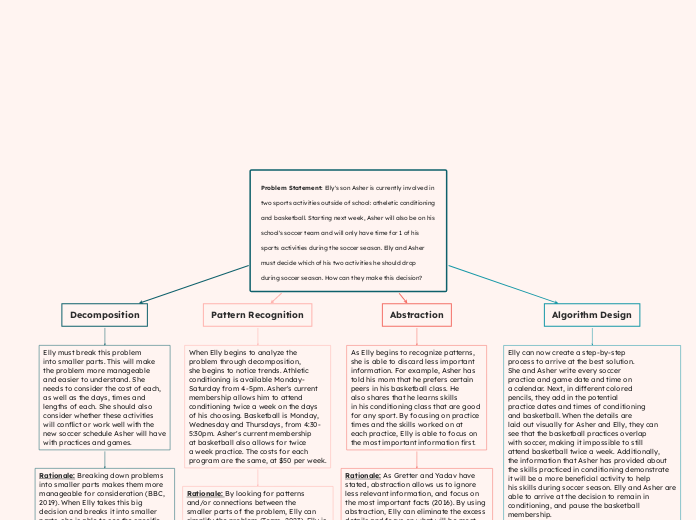Problem Statement: Elly's son Asher is currently involved in two sports activities outside of school: atheletic conditioning and basketball. Starting next week, Asher will also be on his school's soccer team and will only have time for 1 of his sports activities during the soccer season. Elly and Asher must decide which of his two activities he should drop during soccer season. How can they make this decision?
Decomposition
Elly must break this problem
into smaller parts. This will make
the problem more manageable
and easier to understand. She
needs to consider the cost of each,
as well as the days, times and
lengths of each. She should also
consider whether these activities
will conflict or work well with the
new soccer schedule Asher will have
with practices and games.
Rationale: Breaking down problems
into smaller parts makes them more
manageable for consideration (BBC,
2019). When Elly takes this big
decision and breaks it into smaller
parts, she is able to see the specific
details that can help her determine the
correct decision.
Pattern Recognition
When Elly begins to analyze the
problem through decomposition,
she begins to notice trends. Athletic
conditioning is available Monday-
Saturday from 4-5pm. Asher's current
membership allows him to attend
conditioning twice a week on the days
of his choosing. Basketball is Monday,
Wednesday and Thursdays, from 4:30-
5:30pm. Asher's current membership
at basketball also allows for twice
a week practice. The costs for each
program are the same, at $50 per week.
Rationale: By looking for patterns
and/or connections between the
smaller parts of the problem, Elly can
simplify the problem (Team, 2023). Elly is
able to take steps that narrow the
problem down.
Abstraction
As Elly begins to recognize patterns,
she is able to discard less important
information. For example, Asher has
told his mom that he prefers certain
peers in his basketball class. He
also shares that he learns skills
in his conditioning class that are good
for any sport. By focusing on practice
times and the skills worked on at
each practice, Elly is able to focus on
the most important information first.
Rationale: As Gretter and Yadav have
stated, abstraction allows us to ignore
less relevant information, and focus on
the most important facts (2016). By using
abstraction, Elly can eliminate the excess
details and focus on what will be most
important in the decision-making process.
Algorithm Design
Elly can now create a step-by-step
process to arrive at the best solution.
She and Asher write every soccer
practice and game date and time on
a calendar. Next, in different colored
pencils, they add in the potential
practice dates and times of conditioning
and basketball. When the details are
laid out visually for Asher and Elly, they can
see that the basketball practices overlap
with soccer, making it impossible to still
attend basketball twice a week. Additionally,
the information that Asher has provided about
the skills practiced in conditioning demonstrate
it will be a more beneficial activity to help
his skills during soccer season. Elly and Asher are
able to arrive at the decision to remain in
conditioning, and pause the basketball
membership.
Rationale: Algorithm Design allows for a sequence of clear steps to arrive at a solution (Dominguez et al, 2020). Once Elly and Asher have progressed
through the first steps of computational
thinking, they are able to develop a step by step
process to find an ideal solution to their problem.
